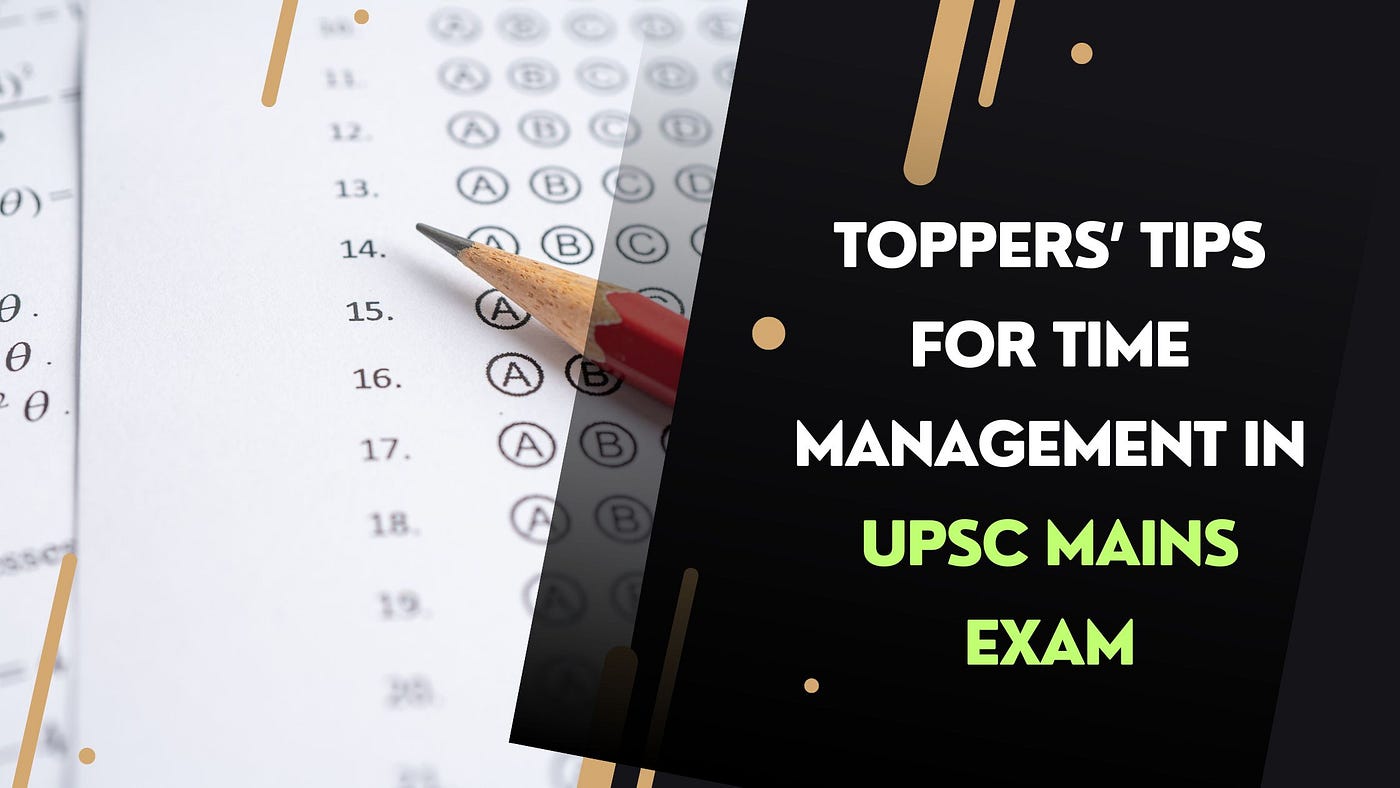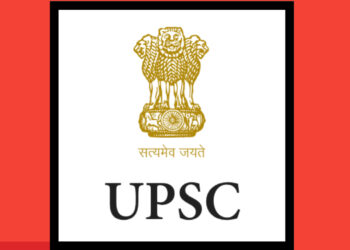Table of Contents
ToggleIntroduction
Time Management During UPSC Mains Exam Topper’s Advice The UPSC Civil Services Examination (CSE) is one of the most rigorous and competitive exams in India. It demands not only in-depth knowledge and understanding of a wide range of subjects but also exceptional time management skills. Among the three stages of the UPSC CSE—Prelims, Mains, and Interview—the Mains Exam is often considered the most demanding due to its comprehensive nature and the sheer volume of content it covers.
In the Mains stage, candidates are expected to write detailed answers for a variety of subjects under strict time limits. As the number of papers and complexity of the questions increases, managing time effectively during the exam becomes crucial for maximizing one’s performance.
Many UPSC toppers emphasize that effective time management not only helps in completing all the questions within the given time frame but also ensures that each answer is given the attention it deserves. The ability to allocate sufficient time for each paper, structure your answers efficiently, and stay calm under pressure is what distinguishes successful candidates.
1. Understand the Structure of the UPSC Mains Exam
Before diving into specific time management strategies, it is essential to understand the structure of the UPSC Mains Exam. The Mains consists of nine papers, out of which seven are considered general studies (GS) and two are optional papers chosen by the candidate.
The breakdown of the Mains exam is as follows:
- General Studies Paper 1: Indian Heritage and Culture, History, Geography of the World and Society
- General Studies Paper 2: Governance, Constitution, Polity, Social Justice and International relations
- General Studies Paper 3: Technology, Economic Development, Bio-diversity, Environment, Security, Disaster Management
- General Studies Paper 4: Ethics, Integrity, and Aptitude
- Optional Paper 1: Subject chosen by the candidate
- Optional Paper 2: Subject chosen by the candidate
- Essay Paper: Candidates are asked to write essays on given topics
- Language Papers: English and one Indian language (Qualifying nature)
Important aspects to note:
- Each GS paper and optional paper carries 250 marks.
- The Essay paper carries 250 marks.
- The Language papers are qualifying in nature (marks obtained are not counted for ranking).
You have a total of 9 hours spread across 2 days for the Mains exam (each day comprising 4 papers). Each paper is 3 hours long and the quality of answers is just as important as the speed with which you write them
2. Pre-Exam Time Management Strategies
While time management during the exam is crucial, it is equally important to manage time during the preparation phase leading up to the Mains. Below are some strategies to help you get started:
2.1. Create a Realistic Timetable
One of the most effective ways to manage time during your preparation is to have a well-structured timetable. UPSC toppers often emphasize the importance of creating a realistic daily schedule that allows for balanced coverage of all subjects. Your timetable should focus on:
- Prioritizing difficult subjects: Tackle more challenging subjects first when you are fresh.
- Allocating time for each paper: Dedicate adequate time for each General Studies (GS) paper as well as the optional subject.
- Incorporating breaks: Avoid burnout by taking regular breaks to refresh your mind.
- Flexibility: Stay flexible with your schedule, allowing time to accommodate unforeseen delays or extra revision when necessary.
2.2. Break Down Topics into Manageable Segments
Large and complex topics can be overwhelming. To manage them effectively, break them into smaller, more manageable segments. For example, in GS Paper 3 (Economy), break down topics like monetary policy, poverty alleviation schemes, or inclusive growth into subtopics and focus on them one by one.
This technique will ensure that:
- You don’t feel overwhelmed by the volume of content.
- You can track your progress more effectively.
- You are better able to tackle each section in a focused manner during the exam.
Read more
2.3. Practice Timed Answer Writing
One of the best ways to improve time management is to practice writing answers under timed conditions. Many candidates tend to over-prepare by reading and revising extensively but fail to practice the most crucial skill: writing within time limits. Set aside time each day to practice writing answers for previous years’ questions or mock papers.
Key steps to follow:
- Allocate 7–10 minutes per question during practice sessions.
- Gradually increase the number of questions you attempt within a given time frame.
- Monitor your progress and work on speed without sacrificing the quality of your answers.

3. Effective Time Management During the UPSC Mains Exam
Once the exam begins, the real challenge is to manage time across multiple papers. Below are some strategies, inspired by the advice of top-performing candidates, for tackling the time constraints during the Mains.
3.1. Plan Your Time for Each Paper
Before you begin writing, take a minute to plan your strategy for the paper:
- Allocate time for each section: If the paper has multiple sections (e.g., GS 1 has questions on history, geography, and society), allocate a fixed amount of time to each section. Spend more time on the sections you find difficult or the ones with more marks.
- Keep a watch: Be mindful of the time. Make it a habit to glance at the clock at regular intervals to ensure you are on track.
3.2. Read the Questions Carefully
Time Management During UPSC Mains Exam Topper’s Advice One of the most important steps to saving time during the exam is to read the questions carefully before starting your answers. Often candidates lose valuable time by misunderstanding the question. Here’s how you can approach it:
- Scan all the questions: Quickly go through the entire paper to gauge the difficulty and mark questions that you are comfortable answering.
- Understand the key words: Pay close attention to directives like discuss, analyze, evaluate, critically examine, and explain. These terms can drastically change the approach to the question.
3.3. Start with the Easier Questions
Time Management During UPSC Mains Exam Topper’s Advice Begin by tackling the easier questions that you feel confident about. This will give you a sense of accomplishment and will boost your confidence for more challenging sections. It will also ensure that you secure some marks in the early part of the exam without spending too much time.
3.4. Manage Time for Long Questions
For long essay-type questions, it is essential to break down your answer into structured segments:
- Introduction: Briefly set the context for the question.
- Body: Divide the body into subheadings or bullet points. Focus on critical analysis, providing relevant examples and data.
- Conclusion: Offer a balanced conclusion that summarizes the key points and presents potential solutions or recommendations.
You can also consider spending more time on questions that carry higher marks and avoid spending too much time on questions you are uncertain about.
3.5. Leave Some Time for Revision
Time Management During UPSC Mains Exam Topper’s Advice After answering all the questions, use the remaining time to review your answers. Double-check for any missed points, factual errors, or grammatical mistakes. Revising the answers will also help ensure that your arguments are presented clearly and coherently.
Read more
4. How to Manage Multiple Papers on the Same Day
Time Management During UPSC Mains Exam Topper’s Advice One of the key challenges of the Mains exam is that multiple papers are often scheduled on the same day. This adds an additional layer of time management difficulty. Below are tips to handle multiple papers effectively:
4.1. Keep Mental Fatigue at Bay
After a taxing three-hour session, it’s natural to feel mentally exhausted. To combat this:
- Practice mindfulness techniques like deep breathing to reset your mind between papers.
- Take short breaks (5–10 minutes) to walk around, stretch, or hydrate during the gap between papers.
- Avoid overloading your brain with extra revision in the break time. Instead, relax and refresh yourself for the next paper.
4.2. Time Allocation for Each Paper
Time Management During UPSC Mains Exam Topper’s AdviceEnsure that you have planned your time allocation for each paper well in advance. After attempting the first paper, you will know how much time you have left to approach the second one. Quickly adapt and prioritize the questions based on their length and difficulty.
4.3. Prioritize the Right Sections
If time is running short, prioritize questions based on their marks and complexity. For instance, if you’re running out of time in the General Studies Paper 4 (Ethics), focus on questions that carry higher marks or those that can be answered concisely.
5. Tips for Efficient Answer Writing in the UPSC Mains Exam
Time Management During UPSC Mains Exam Topper’s Advice Efficient answer writing is a key aspect of time management during the UPSC Mains. Here’s how you can improve your writing skills under time pressure:
5.1. Structure Your Answers
The structure of your answer plays a pivotal role in ensuring clarity and saving time:
- Use subheadings to break the answer into logical sections.
- Write short, crisp paragraphs to enhance readability.
- Include bullet points where applicable, especially for listing facts, examples, or arguments.
5.2. Practice Speed Writing
Speed writing is essential to complete your answers within time limits. Try to:
- Write answers in shorter sentences without compromising on clarity.
- Avoid long-winded explanations and focus on providing direct and concise responses.
5.3. Develop a Writing Template
Having a writing template for common types of questions (e.g., problems and solutions, causes and effects) can significantly speed up the process. This allows you to quickly organize your thoughts and start writing without delay.Time Management During UPSC Mains Exam Topper’s Advice

Conclusion
Time Management During UPSC Mains Exam Topper’s Advice Time management is the backbone of success in the UPSC Mains Exam. With the right strategies, careful planning, and consistent practice, you can master this aspect of the exam and perform to the best of your ability. By following the advice of top-performing candidates, you will be better equipped to tackle the various challenges of the Mains exam and enhance your chances of success.
Read more
FAQs
1. How can I improve my time management skills for the UPSC Mains?
Start by creating a realistic study timetable, practicing under timed conditions, and revising regularly. Prioritize subjects based on their difficulty and weightage in the exam.Time Management During UPSC Mains Exam Topper’s Advice
2. What is the best way to handle multiple papers on the same day?
Maintain focus and avoid mental fatigue. Take short breaks between papers and allocate time effectively based on the paper’s difficulty.
3. How can I practice answer writing for the UPSC Mains exam?
Practice writing answers regularly, analyze model answers, and focus on structuring your responses. Use previous year questions to guide your practice.
4. How do I manage time during long essay-type questions?
Structure your answer into an introduction, body, and conclusion. Allocate specific time slots for each section and focus on key points.
5. How important is revision during the exam?
Revision is crucial as it helps catch any mistakes and improve the quality of your answers. Always allocate the last 10-15 minutes for quick revision of your paper.

















